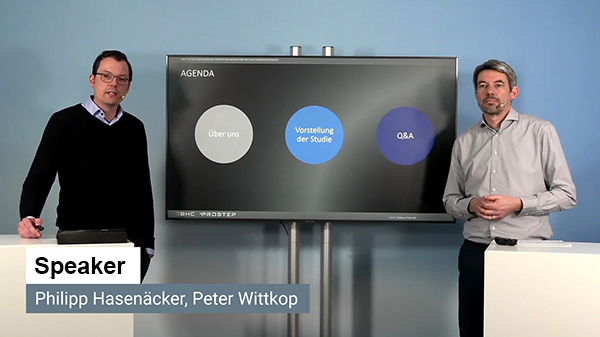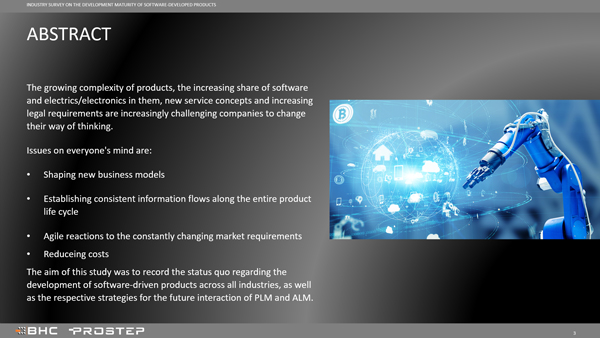
|
Webinar on state of PLM and ALM integration in industryBy Joachim Christ Digital Thread or digital continuity are a major challenge for manufacturers of mechatronic and software-driven products. In particular, the integration of application lifecycle management (ALM) with other domains is often still deficient. This is one of the key findings of a joint study presented by PROSTEP subsidiary BHC and PROSTEP in a webinar. 
The aim of the study was to record the status quo of lifecycle management for mechatronic and software-based products and systems, as BHC Managing Director Philipp Hasenäcker and Peter Wittkop, Lead Expert PLM at ROSTEP, explained to the webinar participants. To this end, both companies conducted interviews with subject matter experts and executives from companies in the automotive and supplier industry (43%), mechanical engineering (36%), the electrical industry (14%), and medical technology (7%) - primarily in Europe. The results are an initial interim status, Wittkop said; it is a snapshot that will be continuously updated. Digital continuity, along with cross-discipline variant and configuration management, is one of the core IT capabilities for modern lifecycle management, Wittkop added. Requirements engineering and engineering change management are the most important processes that need to be supported. On an organizational level, this requires new roles and a cultural change in the companies. While most companies consider Digital Thread and traceability to be key enablers for their future, they have not yet established company-wide traceability, and certainly not across company boundaries, as Hasenäcker explained. Challenges, he said, include the lack of tool support or its lack of usability and evaluability, the lack of user acceptance, and the lack of management support. In addition, he said, there is no common understanding of the use cases of digital continuity that need to be prioritized. Traceability, as was repeatedly emphasized in the interviews, is an important motivation for digital continuity. It is the Swiss Army knife, so to speak, that companies use to address different use cases with. These include, for example, compliance with regulatory requirements or standards such as A-SPICE, impact analysis and data mining, the ability to reuse larger contexts of artifacts, and improving cross-enterprise collaboration. They also want to offer new services through knowledge of product configurations used by their customers. The goal of traceability, however, cannot be to keep all data centralized, Hasenäcker continued; rather, the goal is to link it in a single source of truth. Most companies are not pursuing a single-vendor strategy, but rather a best-of-breed strategy, i.e., they always use the best solution for the task at hand. Learn more about their vision and where the ALM and PLM journey is headed in our German webinar. 
|
|
| © PROSTEP AG | ALL RIGHTS RESERVED | IMPRINT | PRIVACY STATEMENT | YOU CAN UNSUBSCRIBE TO THE NEWSLETTER HERE. |

